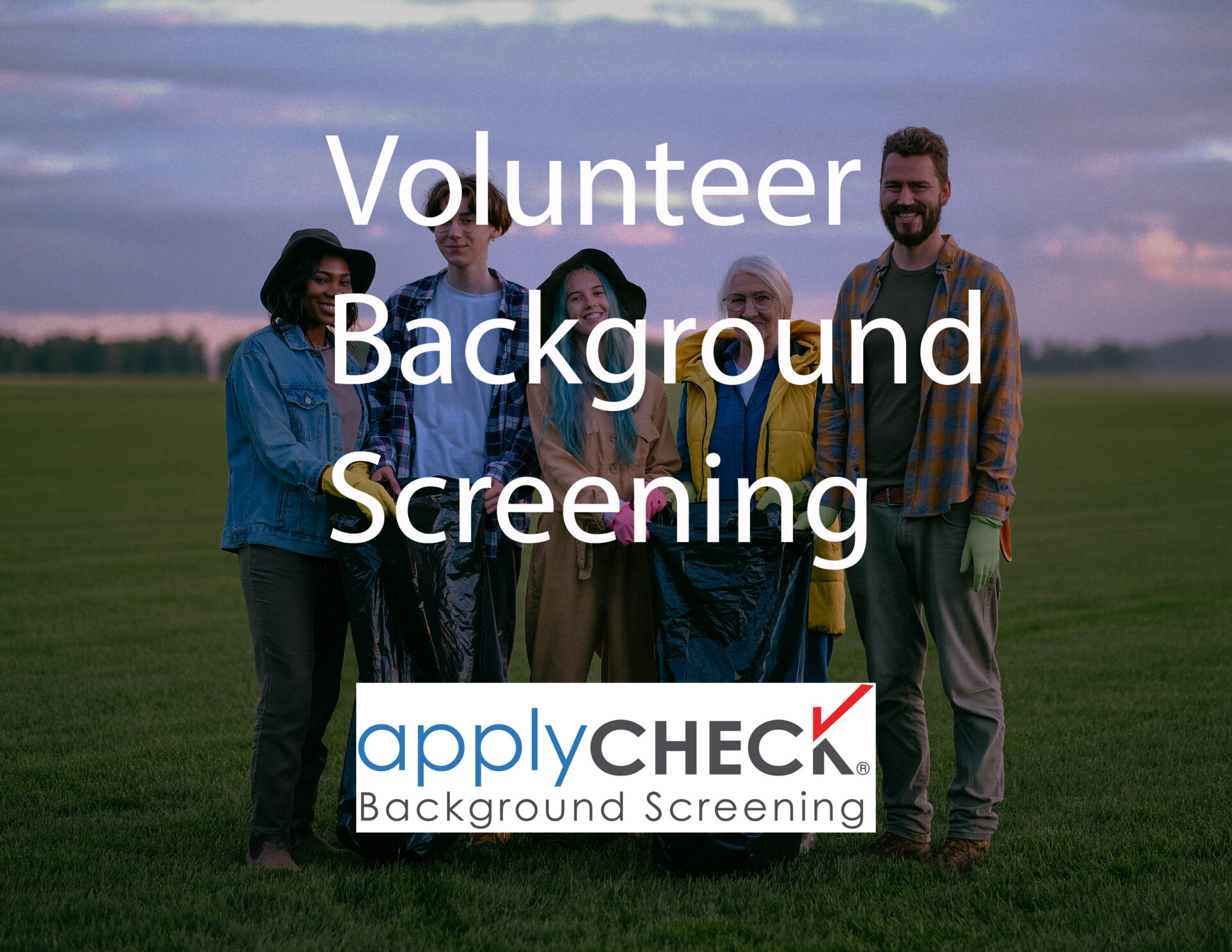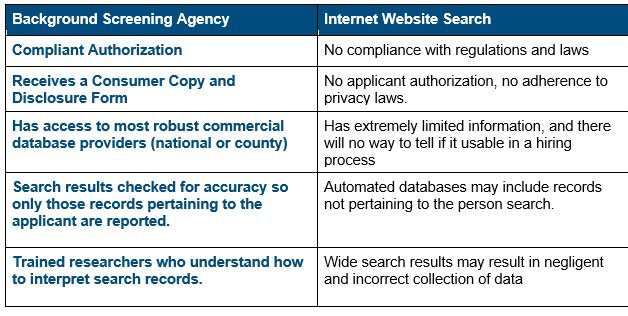
Background Screening for Volunteers
Background Screening for volunteers are provided for use by religious groups, faith-based organizations, non-profit groups and charities. Volunteers are the front-runners of these organizations. Volunteers can be vetted through a background check as you would an employee or renter/buyer. However, some aspects of the process are specific to volunteers. We have put together this guide to help provide volunteer background screening information.
Why Screen my Volunteers?
Volunteers are intrinsic to civil society and provide a wonderful contribution. Without volunteers, nonprofits would be unable to run properly. Although federal and state laws may not directly require background screening for volunteers, legal regulations protect the welfare and safety of at-risk groups. Your state law may require screenings for volunteers working with children, the elderly or the disabled. Most likely, your state requires background screening for volunteers when serving vulnerable groups. For organizations serving the public, volunteer screening is an effective tool for keeping your organization safe.
What Kind of Organizations can use Volunteer Screening?
- Houses of Worship
- Faith Based Service Organizations
- Animal Shelters
- Homeless Shelters
- Museums
- Charities, Non-Profit Groups and Foundations
Federal Laws for Volunteer Screening
Federal laws that regulate volunteer background screening include:
- National Child Protection Act of 1993 (NCPA), 42 USC § 5119(a) signed by President Bill Clinton, sometimes called Oprah’s Law, opened access to the FBI’s national criminal records files to schools and other youth-based organizations. National criminal files opened a potentially new screening method to search child molesters or other conduct that might pose a risk. However, access to the FBI’s files under the NCPA was contingent on state laws and not every state has a law allowing nonprofit organizations access to the FBI files.
- Volunteers for Children Act of 1998 (VCA), (Public Law 105-251), amended the National Child Protection Act to allow volunteer organizations access to federal criminal record files, even without a state law. The VCA does not, however, allow access to the FBI’s criminal files. An organization’s request for access under the VCA must be made through a state agency. The state agency then forwards the request to the FBI who then determines if the organization is a qualified entity. In addition to covering organizations whose volunteers work with children, this law covers businesses or organizations that provide care, treatment, education, training, instruction, supervision or recreation for the elderly and individuals with disabilities.
- Fair Credit Reporting Act (FCRA), 15 USC §1681. The Fair Credit Report Act (FCRA) was founded in 1970 to regulate the collection and use of consumer information. The FCRA falls under the auspices of Federal Trade Commission (FTC). The FCRA was originally constructed to regulate the three dominant credit bureaus (Equifax, TU, and Experian), but has been directed to also regulate authorized background screening agencies. The FTC created guidance about how the FCRA applies to volunteers. In 2011, the FTC indicated that nonprofits should treat volunteers like employees in the application of the FCRA. Securing background checks for purposes of employment is liberally construed to include the use of background checks to determine the fitness of prospective volunteers.
Can I use the Internet to Screen my Volunteer?
An organization may wonder if they should do the background checks themselves. A great deal of information can be found on the Internet. Information can often be had just by googling a person’s name. In addition, many websites offer background checks on anyone, without applicant authorization. Some websites sell criminal history records with little regard to the privacy protections included in the FCRA. They may not adhere to FCRA regulations unlike reputable background screening agencies. The data quality, accuracy, and completeness of information gleaned from such unregulated sources may vary widely. Generic background screening websites may even prove more costly in the end than a professional screening agency as charges mount up for each jurisdiction searched.
Above all, do-it-yourself online searches often violate the first rule of privacy — lack of notice and consent. There are countless benefits to working with a reputable screening agency. If there is ever a case of incorrect information, companies that obey the laws set by the FCRA can aid in conducting an appeal process to resolve that issue. Entrusting your screening process in an authorized organization will ensure an extra blanket of security for your corporation. Those free searches can land you in a position of finding information on an applicant that will be a violation of privacy and be ineffective in learning the applicant’s qualification for the position. Entrusting your background screenings to a professional reporting agency with expertise in understanding database sources and FCRA compliance will provide an additional layer of protection, help ensure accuracy and adherence to the law.
Background Screening Company vs. Internet Search Database
When using an authorized screening company you increase accuracy, help ensure legal compliance and increase privacy protection for your applicants.
Benefits of Using an Professional Background Screening Agency
- Reduce fraud and theft
- Compliance with FCRA laws
- Compliance with legal requirements
- Aides in Public Safety
- Reduce lawsuits due to negligence
- Reduce loss of business
What are the Most Common Screening packages?
- SSN Validation
- National Criminal Search
- Sex Offender Registries Search
- US Most Wanted/Terrorist/FBI Most Wanted
- Office of Foreign Assets Control (OFAC) – for potential matches on the Specially Designated Nationals (SDN) List or Non-SDN Consolidated Sanctions List. This consolidated list includes the Foreign Sanctions Evaders List, the Sectoral Sanctions Identifications List, the List of Foreign Financial Institutions Subject to Correspondent Account or Payable-Through Account Sanctions, the Non-SDN Palestinian Legislative Council List, the Non-SDN Menu-Based Sanctions List, and the Non-SDN Communist Chinese Military Companies List.
What is Applycheck?
Applycheck is an authorized credit reporting agency providing background screening to property managers, homeowner associations, religious organizations, and individuals. To make your screening process easy and efficient, we provide both paper and a paperless online application process with applicant information saved in the cloud.
We require no monthly fees, minimums, or set up fees. Our mission is to deliver detailed and accurate reports, at a price that doesn’t hurt your wallet.
